Language Barriers: Communicating Your Needs While Vacationing in Punta Cana
Understanding the Language Landscape in Punta Cana

Language Barriers: Communicating Your Needs While Vacationing in Punta Cana
Punta Cana, a tropical paradise located on the easternmost tip of the Dominican Republic, is not only renowned for its stunning beaches and all-inclusive resorts but also for its vibrant cultural tapestry. To fully enjoy your stay, understanding the linguistic landscape is essential. This knowledge will enhance your interactions and make your experience more enriching and enjoyable.
1. Official Language and Its Prevalence
The official language of the Dominican Republic, including Punta Cana, is Spanish. It is the primary mode of communication for government, education, and business. Understanding the prevalence of Spanish will prepare you for daily interactions.
In Punta Cana, Spanish is omnipresent in all facets of life. From the signs you see in the airport to the menus in local eateries, Spanish is the default language. For travelers, having a basic understanding of Spanish can be incredibly beneficial. However, in the bustling tourist districts, English is also widely understood, especially in hotels, restaurants, and shops. This duality creates a unique environment where both languages coexist, allowing tourists to communicate effectively even if they only speak English.
2. Commonly Used Foreign Languages
Beyond Spanish and English, Punta Cana is a melting pot of languages due to its international appeal. French, German, and Italian are also commonly spoken, particularly in areas frequented by European tourists. Many locals working in the tourism sector have picked up these languages to cater to the diverse influx of visitors. This linguistic adaptability ensures that most tourists find someone who can understand them, facilitating smoother interactions.
3. Language Diversity in Tourist Spots vs. Local Areas
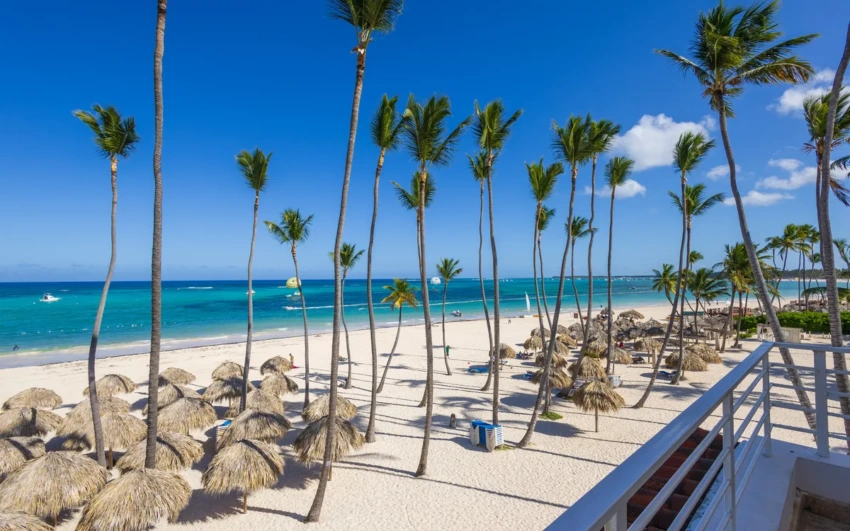
Punta Cana
In Punta Cana, language use can vary significantly between tourist-centric areas and local neighborhoods. In tourist hotspots like Bávaro Beach or Cap Cana, you will find that multilingualism is prevalent. Here, staff at resorts and attractions are usually fluent in English and may even speak multiple European languages to accommodate international guests.
Conversely, in local areas, Spanish reigns supreme. Venturing into local markets, residential areas, or smaller towns around Punta Cana may require a stronger grasp of Spanish as English is less commonly spoken. This discrepancy highlights the importance of learning some basic Spanish phrases or utilizing translation tools to bridge the communication gap when exploring these authentic local experiences.
Understanding the language landscape in Punta Cana is more than just a matter of convenience—it’s a gateway to deeper cultural engagement. Embracing this linguistic diversity opens up opportunities to connect with the local culture and enrich your travel experience.
Section 2: Essential Phrases for Travelers
Navigating a foreign country can be daunting, especially when language barriers come into play. Equipping yourself with essential phrases can transform your Punta Cana vacation from overwhelming to delightful. Here, we explore key phrases that can make your interactions smoother and more enjoyable.
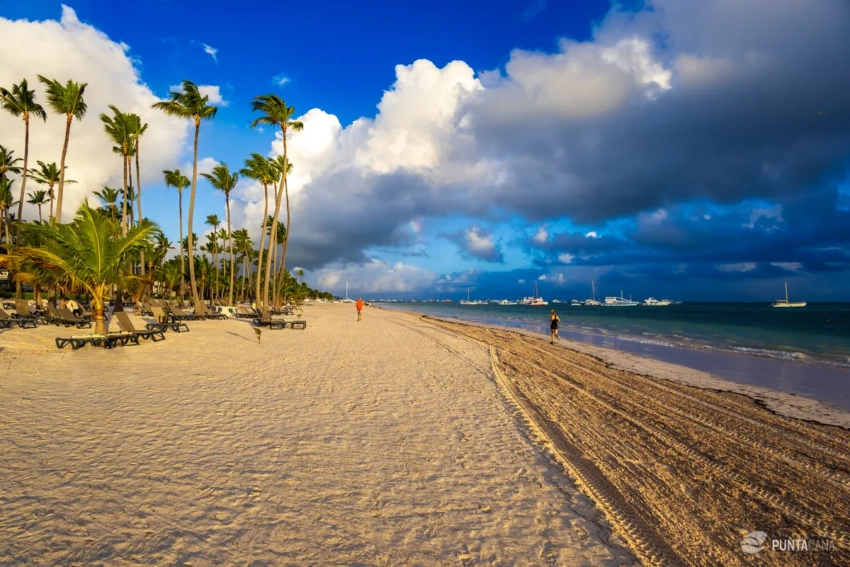
Punta Cana
1. Greetings and Basic Conversations
Understanding the basics of greetings and common expressions is a gateway to connecting with locals. Starting an interaction with a polite greeting can set a positive tone.
- Hola (Hello): A simple greeting that works in any situation.
- Buenos días/tardes/noches (Good morning/afternoon/evening): Use these time-specific greetings to show respect and awareness of the time of day.
- ¿Cómo está? (How are you?): A foundational question to express concern or interest in someone’s well-being.
- Gracias (Thank you): Expressing gratitude is universally appreciated and opens doors to friendlier service.
- Por favor (Please): Adding this to your requests shows politeness.
These phrases can help you break the ice and are often met with a friendly smile, encouraging further interaction.
2. Directions and Navigation
Getting around Punta Cana efficiently requires some knowledge of direction-related vocabulary. Whether you’re catching a taxi or finding a local attraction, these phrases can be invaluable.
- ¿Dónde está…? (Where is…?): Perfect for asking about specific locations, such as “¿Dónde está la playa?” (Where is the beach?).
- ¿Cómo llego a…? (How do I get to…?): Use this to inquire about directions to a destination.
- Izquierda/Derecha (Left/Right): Essential for following or giving directions.
- Cerca/Lejos (Near/Far): Helps in understanding the distance to your destination.
- Taxi (Taxi): Straightforward, but knowing how to ask “¿Cuánto cuesta el taxi?” (How much is the taxi?) can save you time and money.
Using these terms can ease the process of navigating through unfamiliar streets and transport systems.
Our Best Ocean View Villa Rentals in Punta Cana
After mastering these phrases, why not put them to use by exploring the stunning accommodations available? Discover the ultimate relaxation in our ocean view villas, perfect for unwinding after a day of adventure.

Exclusive Ocean View 5-Star Cap Cana Villa for Rent - Chef, Butler, Maid & Golf Cart
from $4600 night Read more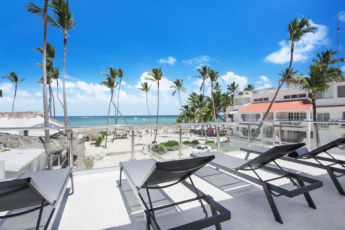
Luxury Villa Right on Los Corales Beach - With Heated Pool, Maid & Chef in Bávaro
from $2995 night Read more3. Dining and Shopping Vocabulary
Dining out and shopping are integral parts of the vacation experience. Knowing the right terms can enhance these activities significantly.
- La cuenta, por favor (The bill, please): Essential for concluding a meal.
- ¿Qué recomienda? (What do you recommend?): A great way to discover local favorites.
- ¿Cuánto cuesta? (How much does it cost?): Crucial for shopping and negotiating prices.
- Desayuno/Almuerzo/Cena (Breakfast/Lunch/Dinner): Helps in understanding menus and meal times.
- Tarjeta de crédito (Credit card): Useful for confirmation of payment methods accepted.
These phrases will empower you to enjoy the vibrant culinary and shopping scenes in Punta Cana, ensuring you don’t miss out on the local culture and flavors.
Mastering these phrases will not only help in practical scenarios but also enrich your cultural experience. Engaging with locals in their language, even at a basic level, can lead to meaningful connections and enhance your overall stay in Punta Cana.
Leveraging Technology for Translation
In today’s digital age, overcoming language barriers while vacationing in exotic locations like Punta Cana has never been easier. By harnessing the power of technology, travelers can ensure seamless communication, enhancing their overall travel experience.
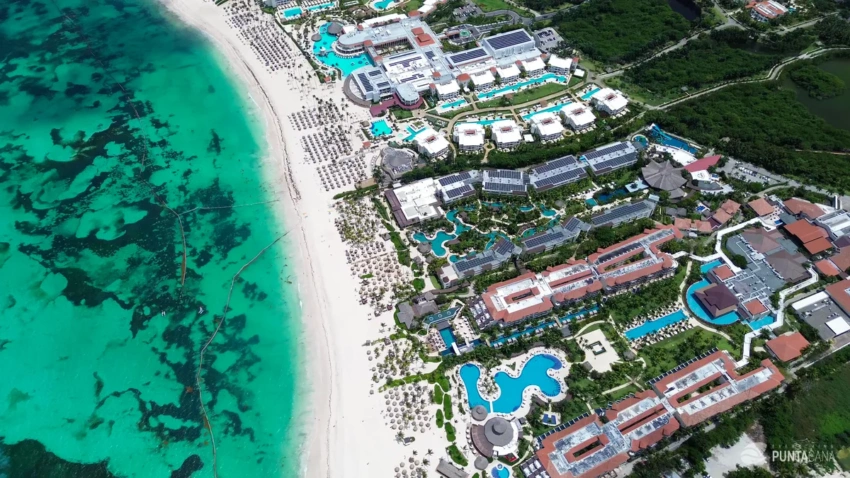
Aerial view of Punta Cana
1. Top Translation Apps for Travelers
The modern traveler is equipped with an array of translation apps, transforming smartphones into powerful communication tools. These apps are invaluable in a destination like Punta Cana, where language diversity is prevalent. Google Translate stands out due to its extensive language database, real-time voice translation, and camera feature that translates text instantly. Similarly, iTranslate offers a voice-to-voice feature, perfect for quick interactions, while Microsoft Translator provides collaborative translation through its conversation feature, allowing for group chats in multiple languages simultaneously.
When selecting a translation app, consider factors such as the range of languages supported, the accuracy of translations, and the availability of offline features. Reviews and user feedback can provide insights into the effectiveness of these apps in real-world scenarios.
Comparison of Popular Translation Apps
| App | Languages Supported | Key Features | Offline Functionality |
|---|---|---|---|
| Google Translate | 100+ | Text, Voice, Camera, Handwriting | Yes |
| iTranslate | 100+ | Voice-to-Voice, Website Translation | Yes |
| Microsoft Translator | 60+ | Real-time Conversation, Phrasebooks | Yes |
2. Offline Translation Tools
For travelers venturing into remote areas of Punta Cana where internet access may be limited, offline translation tools become indispensable. These tools ensure that communication remains uninterrupted, regardless of connectivity challenges.
Offline capabilities are a critical feature in translation apps. Google Translate, for example, allows users to download language packs, enabling translations even without a data connection. Similarly, the SayHi app offers offline functionality for common phrases, which is particularly useful in areas with spotty internet coverage.
In addition to apps, handheld electronic translators can be a reliable option. Devices like Pocketalk offer two-way voice translation with offline capabilities in multiple languages, catering specifically to scenarios where carrying a smartphone might not be practical. These devices are designed for ease of use, often featuring a simple interface and robust language databases.
3. Using Voice Assistants for Language Help
Voice assistants such as Siri, Google Assistant, and Amazon Alexa are more than just digital helpers; they are becoming invaluable tools for language translation. These intelligent assistants can perform real-time translations, set reminders for language learning, and even help with pronunciation, making them essential for travelers in Punta Cana.
Google Assistant, for example, has a feature known as Interpreter Mode, which translates conversations in real-time, simulating an in-person interpreter. Siri’s integration with translation apps allows for quick language assistance, while Alexa can be programmed to provide language tips and cultural insights, enhancing the travel experience.
Integrating these voice assistants into your travel routine not only aids communication but also enriches the cultural immersion, allowing you to interact more confidently with locals. As these technologies continue to advance, they will undoubtedly become increasingly pivotal in bridging language gaps for travelers worldwide.
Cultural Nuances and Non-Verbal Communication
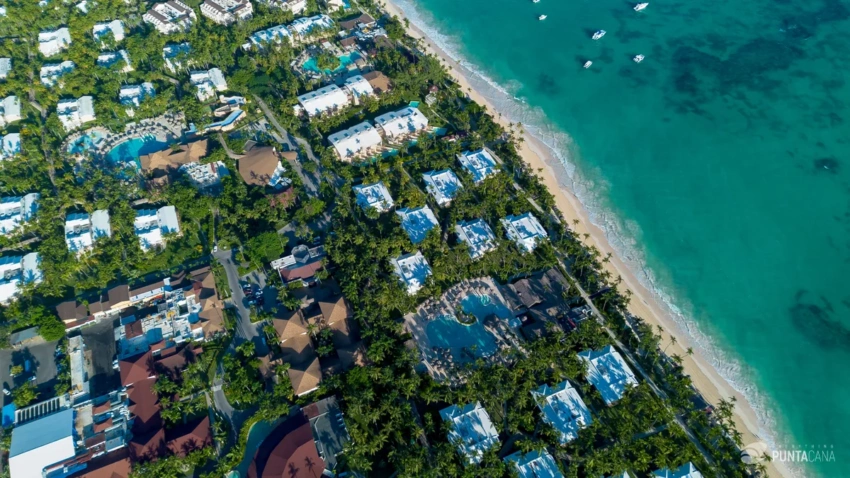
Punta Cana, drone view
When vacationing in Punta Cana, communication goes beyond words. Understanding cultural nuances and non-verbal communication can greatly enhance your travel experience, allowing you to connect more authentically with the locals and navigate social situations with ease.
Body Language and Gestures
In Punta Cana, as in many Latin American cultures, body language and gestures play a significant role in communication. Being aware of these non-verbal cues can help prevent misunderstandings and foster positive interactions.
- Handshakes and Greetings: A firm handshake paired with a warm smile is a common greeting. In more familiar settings, a light hug or a single cheek kiss may be customary.
- Gestures to Avoid: Avoid using the “OK” gesture, as it might be considered offensive. Pointing with your index finger is generally acceptable, but using your whole hand is seen as more polite.
- Personal Space: Dominicans may stand closer during conversations compared to what you might be used to. This is a sign of friendliness rather than intrusion.
Understanding these nuances can make your interactions more comfortable and respectful, showcasing your willingness to embrace the local culture.
Understanding Local Etiquette
Grasping local etiquette is crucial for seamless interactions in Punta Cana. Being attuned to cultural expectations demonstrates respect and can make your experience more rewarding.
- Dining Etiquette: When dining, it’s polite to wait for the host to start eating before you begin. If invited to a local’s home, bringing a small gift is appreciated.
- Respect for Elders: Addressing elders with titles such as “Señor” or “Señora” shows respect and is highly valued in Dominican culture.
- Tipping Norms: Tipping is customary and expected in restaurants. A 10% tip is standard, but feel free to leave more for exceptional service.
By adhering to these social norms, you can navigate cultural interactions with confidence and grace, earning the respect and warmth of the local community.
Building Rapport with Locals
Creating meaningful connections with locals, despite language barriers, can enrich your travel experience. Here are some strategies to build rapport and foster friendships:
- Learn Key Phrases: Even if you’re not fluent, learning a few phrases in Spanish can go a long way. Locals appreciate the effort and are often more willing to engage.
- Show Genuine Interest: Ask about local customs, traditions, and their way of life. Demonstrating curiosity can open doors to deeper conversations.
- Participate in Cultural Activities: Join local events or festivals. Engaging in communal activities can help bridge the communication gap and create shared experiences.
By approaching interactions with openness and respect, you cultivate a sense of camaraderie, making your stay in Punta Cana more memorable and enriching.
Seeking Assistance When Language Barriers Persist
While traveling in Punta Cana, encountering language barriers can be a common hurdle. However, it’s crucial to know that there are various strategies to navigate these challenges effectively, ensuring a seamless vacation experience.
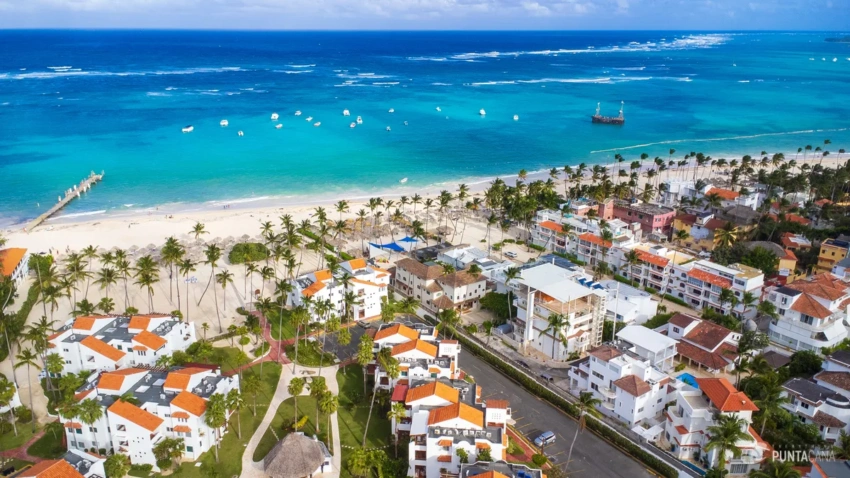
Punta Cana
1. Using Hotel and Concierge Services
One of the most convenient resources available to travelers is the assistance provided by hotel and concierge services. Most hotels in Punta Cana are well-equipped with multilingual staff who can assist with translation and communication tasks. Whether you need help making a dinner reservation or require directions to a local attraction, the hotel staff can often provide the necessary support. Additionally, many hotels offer concierge services that specialize in resolving language-related issues, ensuring guests feel comfortable and understood during their stay.
Before your trip, consider selecting accommodations that advertise multilingual support, as this can greatly enhance your overall experience in a foreign language environment.
2. Tour Guides and Local Translators
Employing the services of tour guides or local translators can significantly enhance your exploration of Punta Cana. Tour guides are not only knowledgeable about the area’s attractions and history but are also adept at bridging the communication gap between you and the local community. Hiring a local translator for more personalized experiences can also be worthwhile, especially if you plan to venture into less touristy areas where English may not be widely spoken.
Our Best Ocean View Villa Rentals in Punta Cana
Discover a range of luxurious villa rentals that not only offer stunning ocean views but also provide dedicated services, including concierge support to assist with any language-related needs. These accommodations ensure your stay in Punta Cana is as relaxing and enjoyable as possible.

Casa de Campo Modern Villa for Rent - All-Inclusive Ocean View Villa with Chef, Butler & Maid
from $4493 night Read more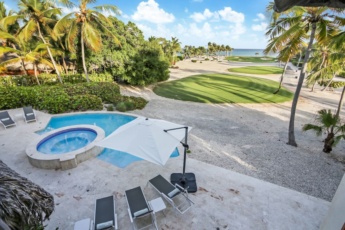
All-Inclusive Ocean View Cap Cana Villa With Chef, Butler, Maid, Pool, Jacuzzi & Eden Roc Beach Access
from $2364 night Read more3. Emergency Communication Tips
In emergencies, being able to communicate effectively is vital. Prepare a list of essential phrases and local emergency contact numbers before your trip. This list should include basic requests for help, medical emergencies, and how to contact local authorities. Consider using translation apps that work offline, as they can be invaluable in situations where internet access is limited or unavailable.
Remember, having a plan for emergency communication can not only provide peace of mind but can be a crucial factor in ensuring your safety and well-being during your travels.
By leveraging these strategies, you can successfully overcome language barriers in Punta Cana, ensuring a memorable and stress-free vacation. These resources and tips are designed to empower you to communicate effectively, regardless of the linguistic challenges you may encounter.
Frequently Asked Questions
What is the primary language spoken in Punta Cana?
The primary language spoken in Punta Cana is Spanish. However, in tourist areas, many people also speak English to accommodate visitors.
How can I communicate effectively in Punta Cana if I don't speak Spanish?
To communicate effectively in Punta Cana without speaking Spanish, consider learning a few basic phrases in Spanish, using translation apps, or carrying a phrasebook. Most tourist areas have staff who speak English, so you can usually find someone to assist.
Are there translation apps that work well in Punta Cana?
Yes, translation apps like Google Translate and Microsoft Translator work well in Punta Cana. They can help you translate spoken and written language in real-time, making communication easier.
Will I find English-speaking staff at hotels and resorts in Punta Cana?
Yes, most hotels and resorts in Punta Cana have English-speaking staff to assist international guests. It’s common for front desk, concierge, and restaurant staff to speak English.
Is it helpful to learn some basic Spanish phrases before visiting Punta Cana?
Yes, learning basic Spanish phrases can enhance your experience in Punta Cana. Phrases like “¿Dónde está el baño?” (Where is the bathroom?) or “Gracias” (Thank you) can be very useful.
Can I use English in restaurants and shops in Punta Cana?
In most tourist areas, you can use English in restaurants and shops. However, in more local or rural areas, having a few Spanish phrases on hand can be beneficial for clearer communication.
What should I do if I have a medical emergency and don't speak Spanish?
In a medical emergency, seek assistance from hotel staff or dial the local emergency number. Many medical professionals in tourist areas speak English. It’s also wise to have a translation app ready to explain your symptoms if needed.
Are there cultural nuances I should be aware of when communicating in Punta Cana?
Yes, showing politeness and friendliness is appreciated. Use greetings like “Buenos días” (Good morning) and “Por favor” (Please) to show respect. This can help in building rapport with locals.
What should I do if I face a serious language barrier issue in Punta Cana?
If you encounter a serious language barrier, seek help from hotel staff or a local guide. Translation apps can also help bridge the gap, and many locals are willing to assist tourists. If the issue involves legal or health matters, consult a qualified professional.
